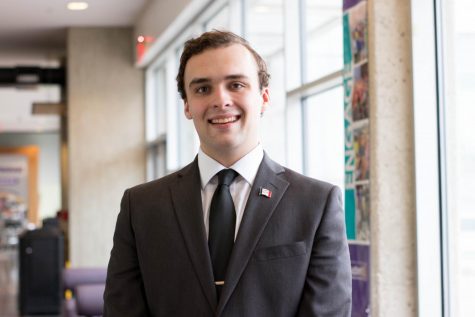All-staff opinion column: What’s the role of the press and campus newspaper?
Mar 9, 2017
I started my undergrad career as a journalism major. I didn’t get very far before learning that the vocation wasn’t for me. But I gained a much greater appreciation for what journalism is and what it is supposed to be than even that which I had before I took Journalism I & II.
I was published in that student paper (the Patrick Henry Herald), though not as robustly or frequently as I have been for the last year with the Northern Iowan. I have thus been involved in student journalism (on and off) since 2010.
It is from that perspective that I argue that the role of a student newspaper at an institution of higher education is not all that distinguishable from the role of a newspaper outside of the academic world: to accurately inform its readers (in this case, students, faculty, staff, etc.) about affairs of interest to them (including, but not limited to, campus-specific events and happenings).
As such, the reporter cannot choose between short wire copying broader statewide, national or international concerns; or putting together original reporting on campus or even broader local concerns. He or she must do both.
One problem remains, however: there is no such thing as a perspective-free presentation of just about any subject, but especially subjects featuring any degree of controversy. If we saw all that was correct and honest about a given subject, we would be divine, not human. As such, interpretations of facts (often called “narratives”) are inescapable, even for the most honest and competent reporters.
Hence, columnists must provide interpretations of the matters described by reporters. In doing so, the columnist enhances public discourse by not only arguing his or her opinion well (grounded in the facts, with clear logic and even some rhetorical flourish) but also providing the intellectual means by which readers can think critically regarding their own opinions.
Thus, the columnist cannot choose between engaging with the reader who agrees (and, eventually, failing to challenge anyone) and with the reader who disagrees (and, eventually, forgetting one’s own rooted self). He or she must do both.
Kyle Day
In my time writing for the Northern Iowan, I’ve grown to appreciate several opportunities its afforded me and the impact the publication has on the community at UNI.
It’s difficult to determine the role that student newspapers have, or should have, on college campuses, but I’ve identified three central purposes of the NI that I consider to be important: increasing accountability, encouraging democratic participation and providing the community with relevant and current information.
In the first year of observing the NI’s operations, I was under the impression that readership was low, therefore the publication couldn’t be notably influential. My assumptions were wrong and I learned this as I’ve witnessed administrators, student government representatives and executive members of student organizations respond to pressure that editorials, opinions and news stories put on providing explanations for particular decisions.
Newspapers are responsible for reporting unbiased information on governmental operations. Regardless of whether these reports come from the federal, state, local or university level, the published information increases constituents’ awareness of pertinent legislation and awareness of opportunities to become involved in elections, town halls, calls to action or protests.
The NI, and student publications more generally, are no exception to this role. The NI reports updates on student government operations, state legislation that affects students and faculty and federal decisions that relate to populations among our student body.
Fundamentally, any news outlet should be providing its readers with information that is both current and relevant to the target community. Campus newspapers have a very specific population that they serve, which might seem to make this task simpler.
Contrarily, given the focused reader populace, relevance becomes much more keen and difficult discern. A lot happens on college campuses from day-to-day and regardless of the impact that certain developments may have on the broader UNI community, a lot of this activity is known only to students that might be associated with particular activities, organizations and or departments, making the duty of identifying and reporting events more complex.
Abbi Cobb
The First Amendment, preceding all others, is a fundamentally American political right. This before any other rights is protected within the Constitution. As a people of the world, created from myriad nationalities to form what is supposed to be a “more perfect Union,” the Constitution provides the foundation of American values, and expresses explicit emphasis on the free exchange of ideas.
Subsequent discourse on this amendment has led the Supreme Court — whose power “extend(s) to all Cases, in Law and Equity, arising under this Constitution” — to determine that this does not protect a speaker whose statement is both harmful and baseless.
The 1942 Chaplinsky v. New Hampshire decision outlines “well-defined … classes of speech” that are not protected by the first amendment.
“These include,” the decision states, “ … those that by their very utterance inflict injury or tend to incite an immediate breach of the peace.”
Such classes of speech are outlined as personal abuse, rather than political statements such as flag burning or similar public displays on issues such as abortion, war efforts, etc.
The 1966 New York Times v. Sullivan decision instituted the “Actual Malice” standard, stating that a member of the press is at fault only when what is printed about a public figure is known to be false or disregards the truth of falsehood of what was printed.
Within this context, it is the constitutional duty of the press to inform their readers of the graces and faults of their public officials, and support their information with evidence. When the press is punished for doing so, it marks a dangerous divergence from the core of American values as outlined by our Constitution.
Such an action places the offending holder of public office at odds with the Constitution under which they are elected to preside, and raises questions on their right and ability to hold office.
It’s like Sean Spicer said before partaking in prohibiting news outlets from attending presidential press briefings, censoring the press is something you would expect from a dictatorship.
Andrew Heppeard
The First Amendment famously states, “Congress shall make no law…abridging the freedom of speech, or of the press …” The nation’s founders inserted freedom of the press into the Bill of Rights with good reason; democracy and civil liberties cannot survive without it.
Thomas Jefferson said in 1786, “Our liberty cannot be guarded but by the freedom of the press, nor that be limited without danger of losing it.”
Yet one of the largest threats to this role of media is not government, but media itself. The advent of television, the internet, the 24-hour news-cycle and social media has brought with it a worrying blend between entertainment and information.
The most recent example of this phenomenon was the 2016 presidential election. Election coverage usually sought to entertain first, inform second. Though Donald Trump’s antics were partially to blame, he is certainly not of sole responsibility. During the primary season, media discussions seemed to revolve around the candidate’s families, their hairstyle and other subjects that really do not seem to warrant national media coverage.
The debates were a joke, and again this is not just a Donald Trump phenomenon. You cannot squeeze all the issues of debate into 90 minutes, give the candidates 90 seconds to answer each question, and expect a substantive, constructive debate.
The answers to the very complicated problems we face cannot be found in a six-second soundbite. The moderators repeatedly failed to stop personal bickering among the candidates.
We need more debates like last month’s Cruz-Sanders debate on healthcare. The two senators were given 90 minutes to exclusively debate healthcare. They were given ample amounts of time to lay out their policy proposals. Both were forced to answer difficult questions.
Some of this change must come from us. Media outlets are for-profit ventures, and they will produce what the market demands. If we want quality media coverage of politics, we must rise up ourselves and demand it; vote with your wallet and your eyes. Media coverage should inform, not entertain, and we can change that.
Joshua Dausener









